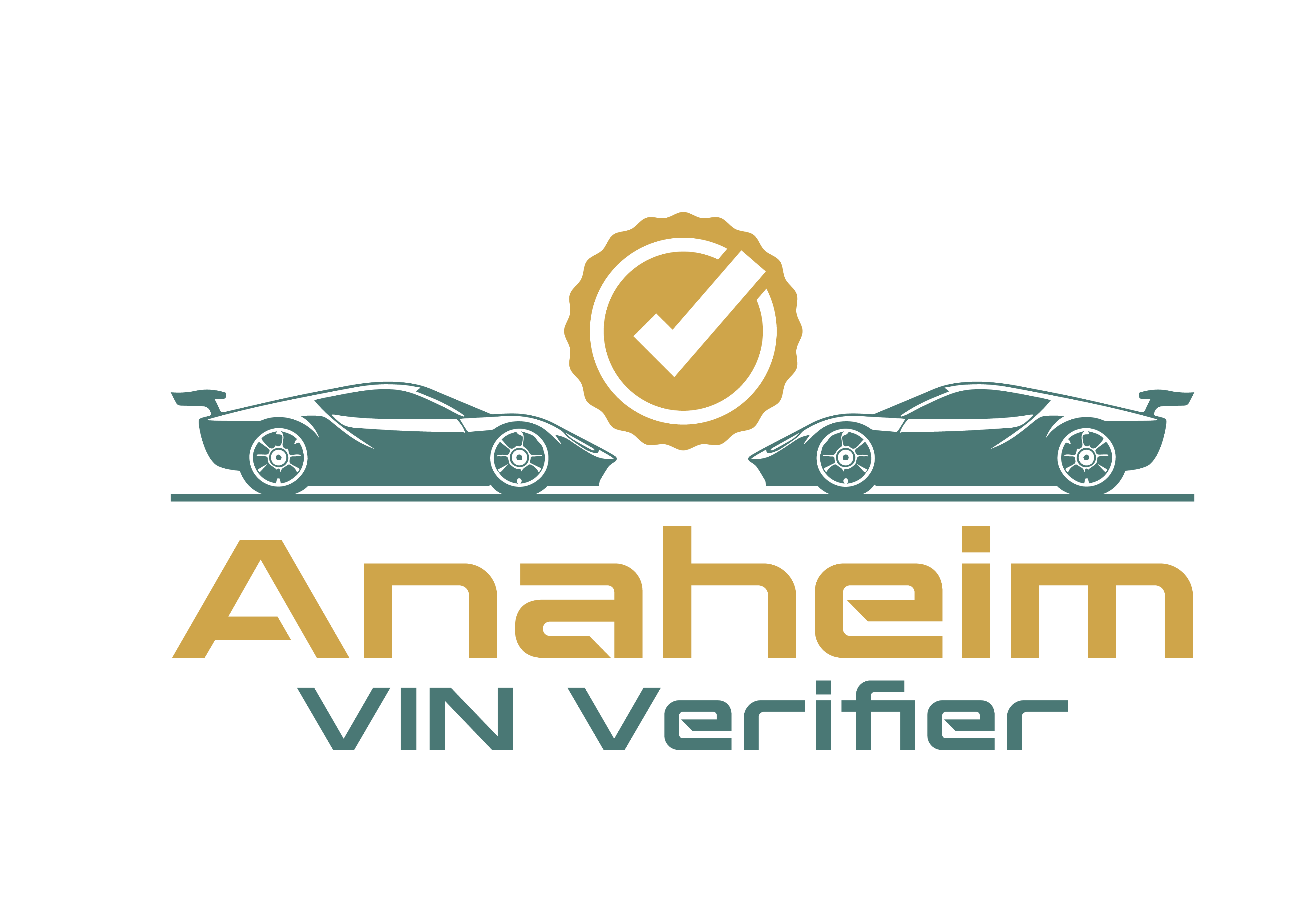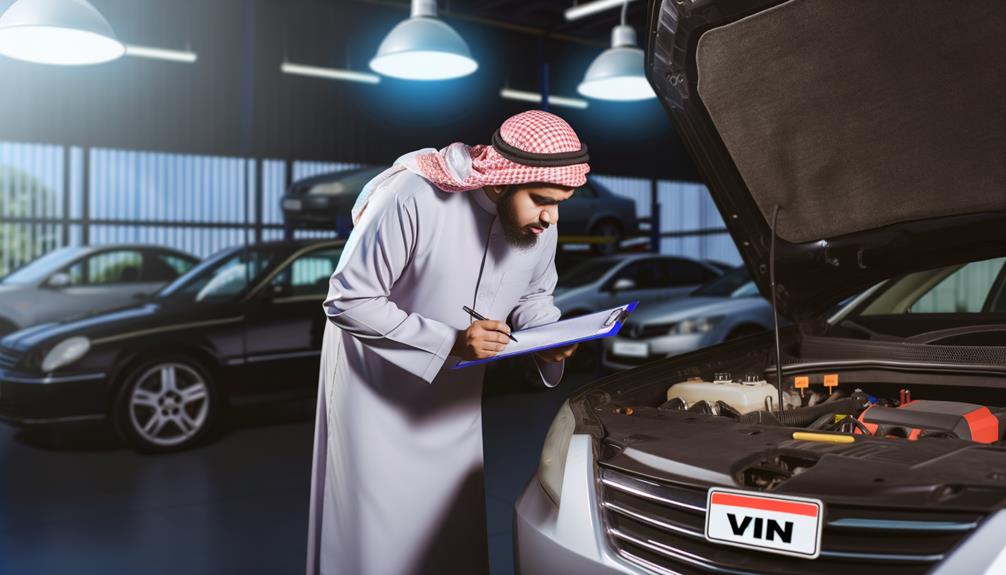Navigating the intricacies of VIN verification in Anaheim can seem daunting, but you're not alone in this process. Whether you're registering a new vehicle or ensuring your classic car meets state guidelines, understanding each step is crucial. You'll need to gather specific documents and choose the right verification location—be it a DMV, CHP station, or a mobile service. The verification itself is straightforward, yet many overlook key details that could cause delays. What happens if you miss a document or choose the wrong verifier? Stick around to uncover common pitfalls and how to avoid them, ensuring a seamless experience.
Understanding VIN Verification
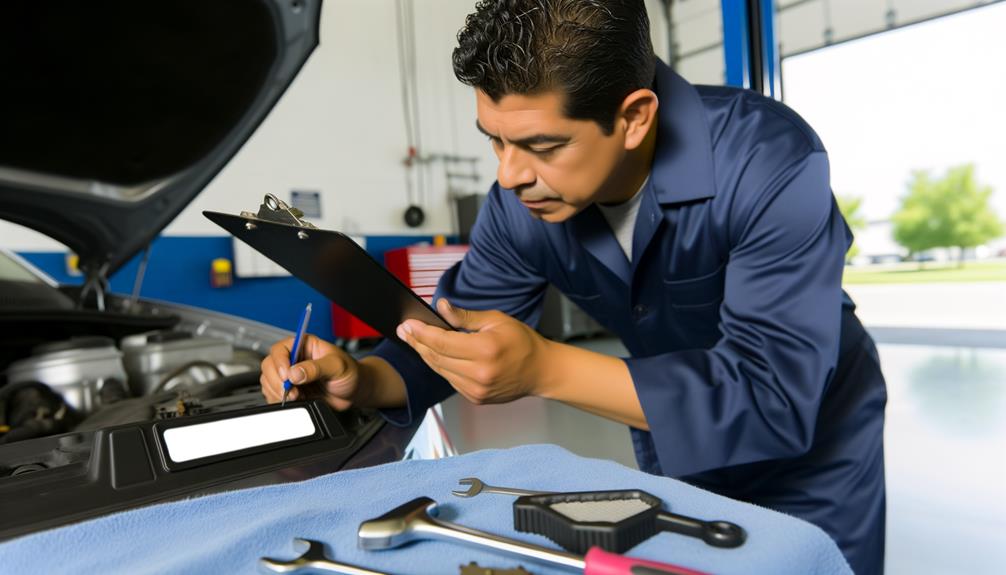
Before you can register your vehicle in California, you'll need to undergo VIN verification to ensure your vehicle's identity matches official DMV records. This critical step is your ticket to freedom on the roads, confirming the legitimacy of your ride. Whether you're bringing in a car from out-of-state, altering your vehicle's body type, or reclaiming it from a tow yard due to a lien sale, VIN verification is mandatory.
VIN verifications are conducted through a physical inspection and the completion of a REG31/VIN verifier form, which records vital details such as the vehicle's year, make, model, and VIN. This process isn't just a formality; it's a crucial measure to prevent vehicle theft and fraud, securing your ownership rights and ensuring that what you drive is rightfully yours. Authorized personnel, including DMV employees and licensed private verifiers, ensure the integrity of this process.
You've got options too. Besides the DMV, authorized agents and mobile services can perform these verifications at a location convenient for you, saving you a trip to the DMV office. This flexibility allows you to meet legal requirements without compromising your schedule, keeping your journey to vehicle freedom smooth and uninterrupted
Preparing for Your Visit
To ensure a seamless VIN verification experience, start by gathering all necessary documents such as your vehicle's title, registration card, and any previous VIN verification forms. Ensuring you have these at hand will streamline the process, letting you focus on the freedom of the road ahead.
Next, check if your vehicle requires a smog certification. This step is crucial for gas and certain diesel vehicles and must be completed prior to your vehicle verification. Sorting this out beforehand saves you the hassle during the verification day. Additionally, remember that a smog check is indispensable in California, and failing to comply can delay the verification process.
It's wise to schedule an appointment with a local VIN verifier. This way, you minimize waiting times and ensure the verifier's availability, particularly if you're opting for the convenience of mobile verification. Remember, your time is valuable, so scheduling ahead lets you maintain control over your day.
Be aware of the specific fees for VIN verification services in Anaheim. Prices vary, with mobile services typically costing more than in-office visits. Knowing these costs upfront aids in budgeting and avoids any surprises
Choosing a Verification Location
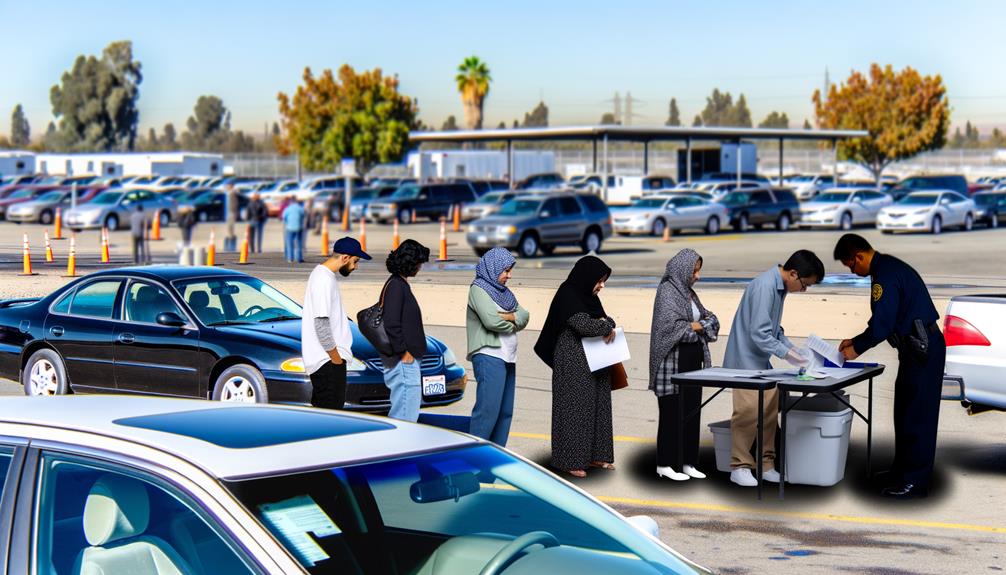
Now that you've prepared all the necessary documents and scheduled your appointment, it's time to select where you'll have your vehicle's VIN verified. In Anaheim, you've got the freedom to choose from several locations. You can go to DMV offices or CHP stations which offer this service at no cost. However, these spots don't provide the convenience of mobile options and might have longer wait times.
If you're looking for a more tailored experience, private vehicle verifiers like Quick VIN Verifications may be your best bet. They charge $75 for in-office services, which is a small price for the ease they offer. Moreover, if you're an AAA member, you can access VIN verification as part of your membership benefits, though it's exclusive to members only.
When deciding, think about your vehicle's specific needs and any unique verification requirements it might have. For instance, if you're dealing with a vehicle recovery from a tow yard or there are discrepancies in your VIN records, choosing a specialized service like Quick VIN Verifications could save you time and hassle in the long run. Choose wisely to make the process as smooth as possible.
Mobile Verification Services
If you prefer skipping the hassle of visiting a DMV office, consider using mobile VIN verification services. These handy options let you schedule an inspection right at your doorstep, whether it's your home or workplace, freeing up your time for more important tasks. Mobile verification services cater to a variety of vehicles, including your daily rides or even trailers, making them a versatile choice for all your verification needs.
Quick VIN Verifications, for instance, provides mobile services across Orange County for $125. While it's a bit pricier than the in-office option at $75, the convenience factor can be well worth the extra cost. You won't just be paying for simplicity; these services ensure thorough checks against official records, bolstering security by helping to prevent any potential fraud.
Moreover, setting up an appointment couldn't be easier. Most providers offer flexible booking through phone calls, their websites, or even emails. This accessibility means you can arrange your vehicle's verification without interrupting your daily routine. Embrace the ease and efficiency of mobile verification services and take control of your schedule without compromising on security.
Documentation and Requirements
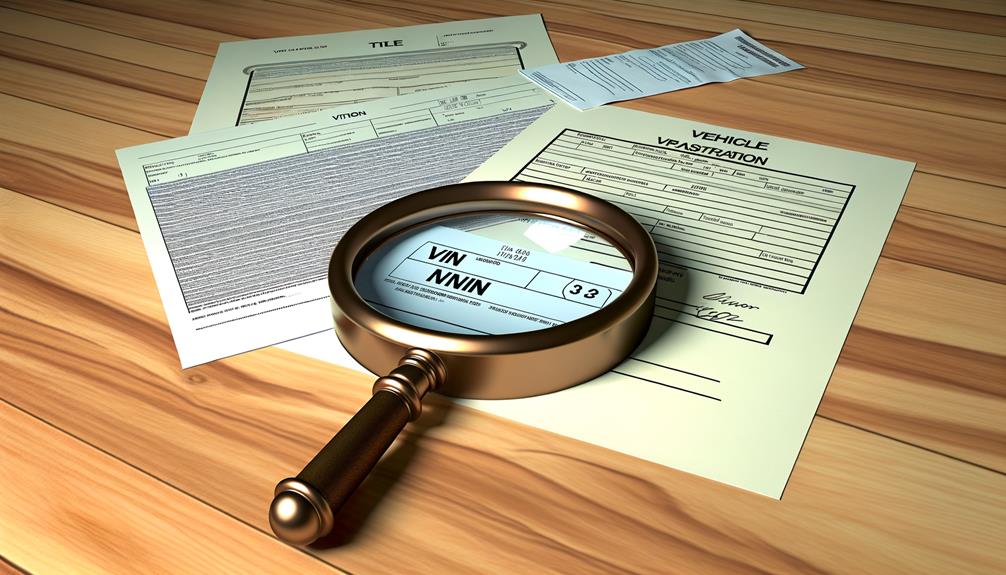
Gathering the right documents is crucial when verifying your vehicle's VIN in Anaheim. You'll need to bring either an out-of-state title, a Manufacturer's Statement of Origin (MSO), or a current registration card. These documents prove that you own the vehicle and are essential for the Vehicle Identification Number verification process.
Additionally, you must complete a REG31/VIN verifier form. This form captures important details like your vehicle's year, make, model, and the VIN itself. It's your ticket to ensuring the process runs smoothly, without any hitches.
If you're bringing a gas or certain diesel vehicles into the mix, remember that a smog certification isn't just advisable—it's mandatory. This certificate is part of California's commitment to maintaining clean air and is required to complete your registration.
For those of you operating commercial vehicles, don't forget to obtain a California Weight-master Certificate. This, along with your other documents, supports the VIN verification of heavier rides.
Lastly, keep your proof of identity and residency handy. These might be needed to verify who you are and that you're legitimately tied to the vehicle. Staying prepared means you're staying ahead, ensuring your freedom to move forward without delay.
Dealing With Failing Dealerships
After ensuring you have all the necessary documents for VIN verification, another issue that might arise involves purchasing vehicles from dealerships that are at risk of failing. You should first verify the legitimacy of the dealership. Check their business license and sift through customer reviews to sidestep potential scams. It's crucial to grab all essential documentation, such as the title and any previous registration papers, to cement your legal ownership of the vehicle.
Further, researching the financial health of the dealership can shield you from future headaches. A failing dealership may not honor warranties or service agreements post-sale, leaving you in a tough spot. If things seem dicey, it's wise to seek professional advice or even legal counsel. This move will help you navigate any murky waters that might surface after your purchase.
Be cautious, as buying from a failing dealership could hurl you into legal battles if the dealership shuts down soon after your deal, complicating your efforts to register the vehicle. In these scenarios, a seasoned vehicle verifier becomes your ally, ensuring you're not left stranded with unresolved ownership or service needs.
Classic Car VIN Specifics
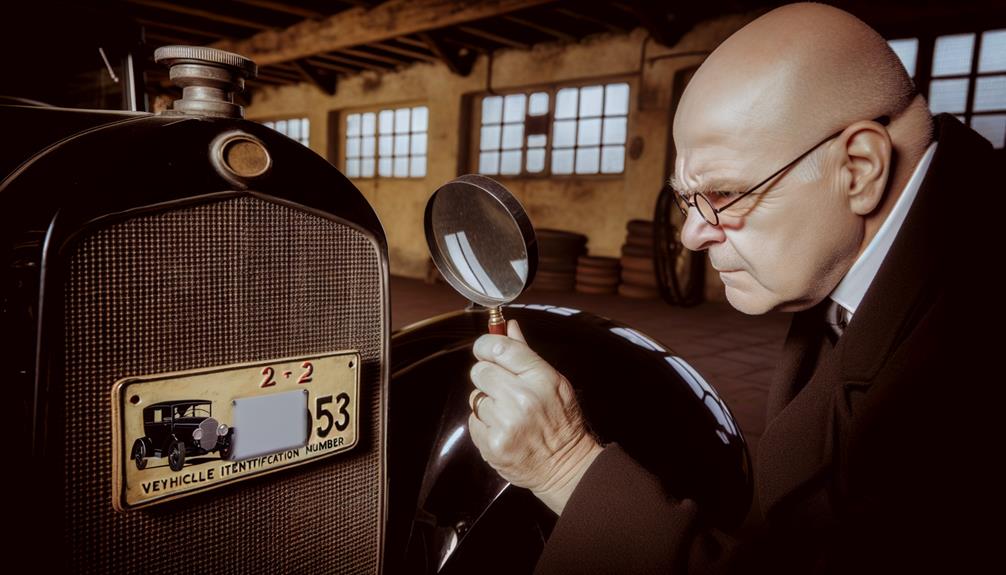
Diving into the world of classic cars, you'll find that VIN verification plays a crucial role in confirming their authenticity and ensuring they're properly registered. As you navigate this journey, understanding the unique characteristics of classic car VINs is essential. Unlike modern vehicles, classic cars often have VIN formats that reflect their era of manufacture, which can be puzzling if you're not familiar with historical automotive detailing.
When you're handling a classic car, remember that any modifications or restorations need to be well-documented alongside the VIN. This isn't just about keeping your beloved car road-worthy; it's about maintaining its value and ensuring compliance with verification standards. You don't want any surprises that could jeopardize your ownership or lead to legal headaches.
Joining a classic car club can be a game-changer. These clubs offer a wealth of resources and support, specifically tailored to vintage vehicles. They understand the nuances of classic car VINs and can guide you through the verification process smoothly. This community can be your greatest ally in preserving the freedom to enjoy your classic car without unnecessary constraints. Remember, the market value of your classic heavily depends on the authenticity of its VIN, so it's worth getting it right.
Completing the Verification Process
To complete the VIN verification process in Anaheim, you must first arrange for a physical inspection of your vehicle by an authorized verifier. Remember, this step is crucial to ensure your freedom to drive and register your vehicle without legal hitches. During this inspection, the verifier will compare your vehicle's VIN with DMV records, confirming its legitimacy and history.
Next, you'll need to fill out the REG31/VIN verifier form. This form is vital as it records your vehicle's year, make, model, and VIN—all essential details that must be accurately documented.
Make sure you have the necessary documents handy—your vehicle title, registration card, or Manufacturer's Statement of Origin (MSO). These documents prove ownership and are indispensable during the verification process.
If convenience is a priority for you, consider using a mobile VIN verification service. Although it might cost a bit more, the benefit of having someone come to your location can save you time and hassle, particularly if you're managing a tight schedule.
This verification step is not just a formality; it's a safeguard against fraud and a requirement for registering an out-of-state vehicle in California. Ensuring that your VIN matches official DMV records keeps your vehicle dealings above board.
After Verification: Next Steps
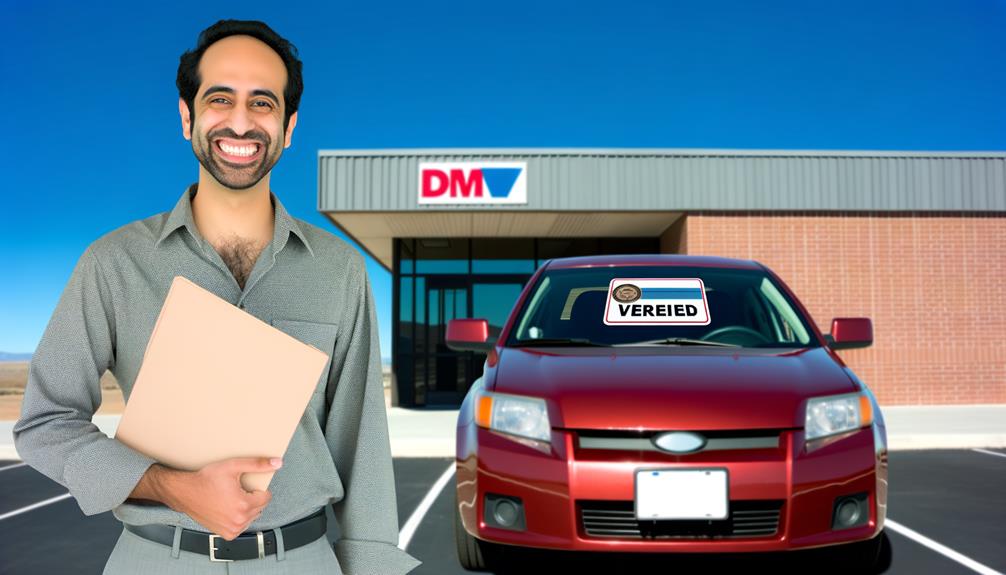
Now that you've completed the VIN verification, what's next? It's time to gather all essential documents, including the REG31 or VIN verifier form, for your next stop: the Department of Motor Vehicles (DMV). You'll need these for the registration process. If you're dealing with a gas or specific diesel vehicles, don't forget to obtain a smog certification. This step is crucial, as it's a prerequisite for registration in California.
You should also schedule an appointment with the DMV. Doing so can significantly cut down your wait time and streamline the registration process. It's all about making things easier for you, so you can enjoy your freedom without the hassle of long lines.
Keep a copy of your VIN verification form. It's not just paperwork; it's your proof in case any disputes arise concerning your vehicle's identity later on. If there were any discrepancies noted during the verification, make sure to resolve these issues promptly. Addressing them now will prevent any complications when you're at the DMV, ensuring a smoother process to get you back on the road with peace of mind.
